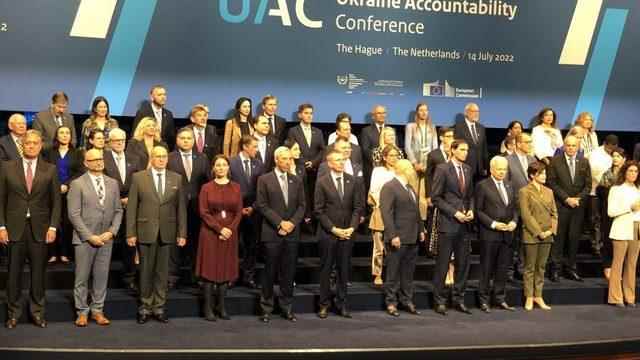President Volodymyr Zelenski’s proposal to establish a special tribunal similar to the former Yugoslavia and Rwanda to prosecute war crimes in Ukraine was not accepted at the international conference in The Hague, Netherlands.
The possibility of veto by Russia, a permanent member of the United Nations (UN) Security Council, makes the formation of such a tribunal almost impossible.
Instead, nearly 50 countries have pledged money and expert support for the investigation of war crimes in Ukraine.
Under the leadership of the Netherlands, in cooperation with the International Criminal Court (ICC) and the European Commission, the “Ukraine Accountability Conference” was held in The Hague on Thursday.
At the conference attended by high-level representatives from approximately 50 UN member countries, President of Ukraine Zelenskiy made a speech via video conference.
Zelensky stated that the war in Ukraine was the biggest act of aggression in Europe since World War II, and therefore suggested the creation of a special judicial mechanism similar to the Nuremberg Tribunal.
According to the Prosecutor General of Ukraine, Irina Venicetova, who attended the conference, about 23,000 war crimes reports have already been made.
“Every day, 200 to 300 more people are added to this. At least 600 suspects have now been identified and criminal proceedings have been initiated against 127 of them. Six soldiers have already been convicted,” the Ukrainian prosecutor general said.
Venicetova urged the international community to take action as soon as possible.
Dutch Foreign Minister Wopke Hoekstra, who hosted the conference, also welcomes the establishment of an international war tribunal on Ukraine, as in the former Yugoslavia and Rwanda.
Russian veto
However, according to the member countries participating in the conference, this is not an easy step. It is considered certain that Russia, a permanent member of the UN Security Council, will veto such a court.
It is theoretically possible to establish a court without Russia, but this is a very long process and it is almost impossible to make a trial without Moscow’s support.
Didier Reynders, the high representative of the European Union (EU) Commission for justice, thinks that it may take decades for all suspects to be tried.
Emphasizing that he is not pessimistic on this issue, however, Reynders pointed out that the investigation into the massacre that took place in Rwanda 28 years ago is still continuing, and said that all those responsible could be prosecuted until the end of their lives.
Dutch Foreign Minister Hoekstra also stated that it would not be easy to establish such a court. “Russia will try to counter this, but we will also try to dedicate our resources to it,” he said.
The Dutch minister pointed out that not only Russian war crimes would be prosecuted, but war crimes committed by Ukrainian soldiers could also be investigated.
“But there is one party that is clearly responsible for the attack, and that is Russia,” Hoekstra said.
Countries participating in the conference pledged 20 million euros to the International Criminal Court for the purpose of investigation and psychosocial support for victims of sexual violence in Ukraine.
Participating countries have also adopted sending forensic experts to Ukraine to gather the necessary evidence to investigate war crimes.
Ukraine, together with Poland, Lithuania, Estonia, Latvia and Slovakia, formed a Joint Investigation Team two months ago that investigates Russia’s war crimes.
This investigative team is supported by the International Criminal Court (ICC) in The Hague.
